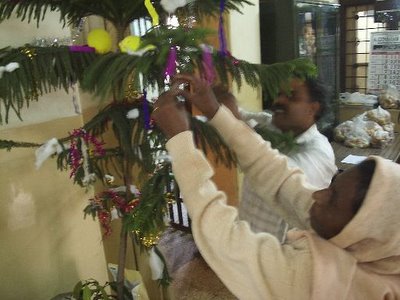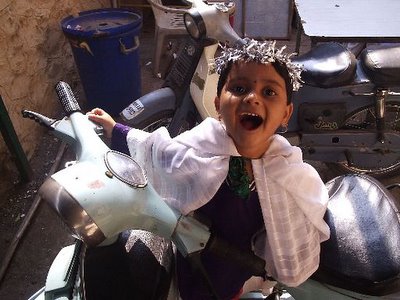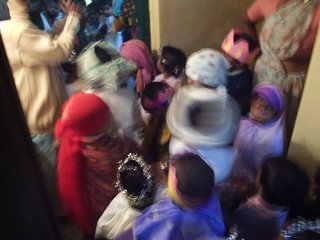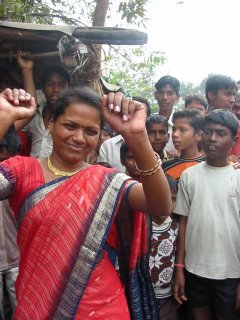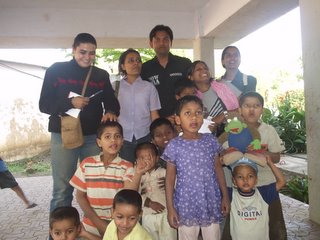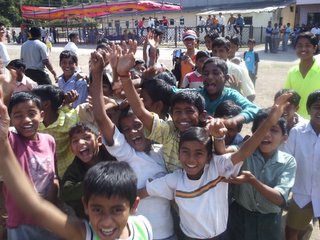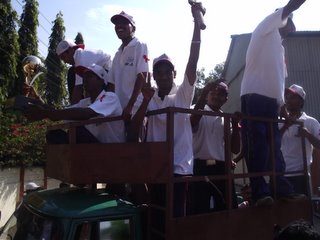Saying Thank You
A young girl peeps around the fence post. “Didi”, she calls. I look up from my marking as I sit on the front step of the Deep Griha building at Tadiwala Road. I am waiting for the blue Deep Griha rickshaw to take me to Ramtekadi for an English class. I see Kajal smiling at me from behind her hiding place, and I smile and wave. She waves back. I watch her as she turns to walk towards wherever home is for her. She cannot be older than five, but she is taking herself home, bag in hand. As she walks a parked rickshaw momentarily obscures her, and then I watch her turn to see whether I am still looking. I am, and I wave again. She smiles and waves. This becomes our game. I watch her as she becomes smaller and smaller, periodically stopping, looking, waving at me, until she disappears into the crowds of Tadiwala Road.
The four months I have spent with Deep Griha are full of memorable encounters such as this. Often it is the small details that remain in my mind and heart. Meister Eckhart, the German mystic, once wrote that if the only prayer you said in your whole life was, “thank you”, that would suffice. As I reflect on all I have experienced, and that ways in which my life has been enriched by the Deep Griha Society, I wanted to share some of the most moving and rewarding moments of my time in this remarkable place, as an expression of gratitude for all I have experienced here.
Indian people are famous for their warmth, hospitality and generosity, and that will be one of my abiding memories. I am always greeted with a smile and ‘Namaste.’ I have been invited to so many meals and celebrations, and fed delicious biryani, salad and puri, ladoo and gulab jamoon until I was physically unable to eat more! Early on in my time in India, I was taken out by some of the field workers into the slums and I was amazed by people’s generosity. Even in the smallest room, full of a large family and newborn baby, I was given a mug of chai and (despite my protests) a chair was produced for me to sit on, while everyone else sat on the floor. The house was spotless in contrast to the grime of the pathway outside, and I was touched to see an elderly woman tenderly hand-feeding a goat kid with the outer leaves of a cauliflower. There is surprising warmth in even the harshest conditions, and I will not forget this courage and generosity of spirit.
In the Deep Griha building, various things will remain in my memory. One is walking into the hall to teach my younger School Dropout class, to be greeted by cheers and joyful shouting! And to see them laugh and giggle at Head, Shoulders, Knees and Toes getting faster and faster, or to see them cheering for Hokey Cokey. Then, later during the lessons, a quiet whisper from one or other of the students wanting me to stop and admire their artistic efforts. Meanwhile, while I am planning lessons I regularly feel I am offering a child-minding service, as various small people appear and ask to do drawing or watch me as I plan my lessons. In particular I will remember the friendship of the some of HIV positive young people who come and talk to me as I work.
I have already written here about the picnic organised for my School Dropout classes at City of Child. It was so rewarding to see the joy of the children throughout that day, and to see them still smiling about it weeks later. I will also remember the Christmas Party I recently organised for that class. When I arrived, Anwar announced that he had a gift for me. He proudly produced a beautiful model house he had made, and wished me a Happy Christmas. I was so touched. I set up some Hindi dance music for the students to dance to, and got to work putting plates of food out ready for them. Soon their teacher appeared, and gave me a gift from them all. Again, I was amazed by their kindness. I was presented with two hairclips, one of which was gold-coloured, inset with decorative glasswork, and a necklace and earrings. Soon I was being dressed in this new attire by the teacher, under the supervision of all the students! Later the teacher, the students and I all enjoyed dancing and laughing together, and spinning each other around in time to the music.
My adult classes have been no less rewarding. I am greeted always by smiles and a warm welcome. Throughout the lessons the staff work hard and are keen to please, showing me their notebooks with shy pride. At the end of each lesson, I always introduce some topic of conversation. Through listening to my students, I have learnt how hard people work, and the challenges they face in their daily lives and with their families. Illness, suffering and death seem to be a constant reality. I have been touched to see women moved to tears when sharing what Deep Griha means for them, or to hear stories of tremendous courage and resilience in the face of adversity. These students are invariably dressed in a rich assortment of brightly coloured saris, and somehow those bright colours shine through from the inside too.
When I took over the English classes at Bibvewadi in November, it was my first visit to that particular slum area, and to witness Deep Griha’s work there. I instantly liked the atmosphere and the people I met. Unlike the other slum areas, there is no road running through at Bibvewadi. You walk through some railings and on foot down narrow alleys, passing children, men and women sitting in the pathway, playing, peeling vegetables, working, talking, while dogs, goats, cats, chickens and other animals wander along the pathways also. The buildings are mainly made of corrugated iron. People are sociable, sitting on their doorsteps shouting greetings to me, while children run to shake my hand as I walk past. There are many flies. One day I saw a woman shaking some dried meat on a sheet, while thick clouds of flies covered the meat. Even inside the two corrugated iron shacks that are Deep Griha’s buildings at Bibvewadi, the flies are persistent. They simply walk and sit on you, too many to fight, they are left alone. It is dark inside the buildings, despite the electric light bulb that gives some light, as there are no windows. There is also no water and no toilet. Yet the people are always smiling, and there is a strong sense of community. People are not isolated in the slums as they are in Western countries, estranged from others by their own four walls and wealth. This is not to glorify the suffering of these people, but to observe that many of us have much to learn from their courage, hospitality, joy and bonds of community.
I have also been teaching English to a group of trainee nurses, as part of the women’s empowerment work. This month they have begun their practical placement in a local hospital. They have asked me to go and visit them there, and I will try to fit this in before leaving Pune. However, my daily lessons with the nurses came to an end earlier this month. To celebrate the ending of all we had shared together, I organised a party for them. I invited them to the Cultural Centre, where the volunteers live, during the day when everyone else was at work. I borrowed a DVD player, hired a DVD and showed them a movie in English that I thought they would enjoy. We watched Bend It Like Beckham, a movie about a young Sikh girl in London who wants to be a football player. They seemed to understand it, and laughed at all the funny parts, which I was glad about. I also bought some party food, and ordered a cake for them. It turned out to be someone’s birthday, so we put candles on the cake and sang Happy Birthday to her. Once the movie had ended, the girls put on Hindi music on the television, and were dancing together. At the end they sang some songs to me, and I sang to them. As I waved them off, and they got into the minibus to be driven back to Deep Griha, they said things like, “I will miss you very much, madam”. Perhaps they do not know how much I will also miss them.
Another unforgettable day of the past month was World AIDS Day. For the first time this year, Deep Griha organised a rally on the morning of 1st December (World AIDS Day). We marched for several hours with placards around the Tadiwala Road slum area, raising awareness and inviting people to an event later that evening. We spent the afternoon setting up for the ‘Celebration of Life’, which was to follow. In an open area in the heart of the slum, with a concrete stage, we got to work. A thousand chairs had been hired, but there was still plenty of space left for thousands to stand. Behind the stage, against a backdrop of white, we pinned huge letters saying ‘DISHA Celebration of Life 2005’, with two plain red saris making the symbol of the red ribbon at each side. The evening began with an introduction and song by DISHA staff. A wonderful programme of events, including HIV positive speakers; dances by people with AIDS; a play; singing and an address given by a DISHA worker, followed this. The guest of honour awarded prizes for a recent DISHA cricket tournament and DISHA street play competition. The most moving performance for me was a professional dance performed as a means of sex education. With dancers representing white blood cells, viruses and HIV, the dance portrayed the death of a young man, after being infected with HIV, showing how the white blood cells were unable to defend him after he became HIV positive. The message was both clear and moving. I was also moved by the courage of the HIV positive speakers, who risked being marginalized in their communities to share something of their stories, and who were themselves moved to tears. The volunteers were asked to present something for the evening, and we put together a candle dance to the song, ‘True Colours’, which was photographed and printed in a Maharashtra state newspaper under the title, ‘Lighting the Fight Against AIDS’. This was the first time I had sung and danced in front of thousands of people, and it was a memorable occasion in every way.
As I reflect on the months gone by, I feel a sense of gratitude about all that has been. I came here wanting to offer what I could of my skills and experience, and knowing I had much to learn from the people I would meet. Most of them may never know how profoundly they have influenced my life, but I have written this as a tribute to all the people I been privileged to come to know in Deep Griha and in Pune. There have been challenges, and life has been demanding; yet a whole community of people have entered my heart and will remain there. I am so thankful for all that they, and India, have given to me.
Thank You and Om Shanti.
